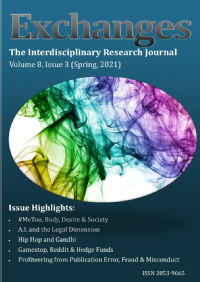Writing about web page https://warwick.ac.uk/fac/cross_fac/ias/postdocs/accolade/calendar/summer/#story8
I was speaking today as part of the IAS’ Accolade programme in an AMA (ask me anything) segment about the journal and the podcast. There was an excellent question from the audience about the different formats we accept for publication, and I waxed lyrical for a while about interviews. Hence, I thought it was perhaps worth capturing some of the points of interest for future authors.
Interviews, or conversations as they’re termed in the journal, were very much Exchanges’ stock-in trade in the early years. If you look at those nascent years, you’ll see time and again interviews with significant figures and scholars cropping up in the pages. This was, in part, an artefact of the close association the journal enjoyed (and continues to) with the IAS’ fellows programme. Many of the participants would, as part of their research programme, arrange for a significant scholar to visit Warwick for a period, to engage with the local community and potentially spark an ongoing collaboration. During such visits, keen fellows would stage a recorded and transcribed interview with these visitors, which would then be submitted to Exchanges as a partial record of the engagement success.
In recent years, as the journal has consciously decoupled from Warwick somewhat as part of our move towards a greater internationalisation, these interview submissions have dropped away. It is not that they solely come from Warwick, but with our close organisational and operational links, I suspect we spurred more of our local scholars to produce them than the wider author community. I am racking my brain currently to think about the last time I actually had a conversation piece which we saw through to publication.[1]
Nevertheless, what I wrote in an earlier blog post about the value of these interviews/conversations stands. They are always highly read, often downloaded and very warmly received by the readership. They provide an accessible gateway into a subject area for scholars old and new alike, and do wonders for the authors in associating their names with that of their interview subject in print! They are also, relatively speaking, an easy format to create an article around and as such I remain surprised we don’t continue to get more of them. Compared to the weeks and months you’ll labour over a peer-reviewed article, a conversation piece [2] is a relatively easy ‘win’ to add to your publication record: while also making a valuable addition to the wider disciplinary discourse!
Which brings me to today and my discussions about formats for the journal. In the past we’ve generally had conversation articles which are comprises of a singular subject along with one or two interlocutors providing much-needed context, asking questions and steering the debate. It is a talking head format which works well, so well in fact that I’ll confess it forms the basis of The Exchanges Discourse’s configuration when we have guest speakers on the podcast. What we haven’t had though on the podcast or as interview papers in the journal are true discourses: that is, debates between a small coterie of speaking-heads in discussion. I’m know such discussions are frequent occurrences in formal and informal settings aplenty, not just at our home institution of Warwick, but within the various interdisciplinary-led early career researcher communities around the globe.
While part of me thinks such a format would be ideally suited to appear on our the podcast [3], I think such a discussion transcribed would also create an engaging, entertaining and informative article. If I’m being honest, I can almost see one now with three scholars: one drawn from within the STEM social science and arts and humanities disciplines apiece; debating what they envisage or perceive impactful and fruitful interdisciplinary research and practice to comprise.
Such a discussion represents a titular topic for the journal, but oddly not one with which we’ve ever had an interview specifically dealing. There are undoubtedly many other topics which might be debated in this collegiate manner as a conversation article for the journal. Certainly, I would strongly encourage anyone who is inspired by this idea to consider proposing or submitting it. Naturally, I stand ready, as always, to provide guidance and advice on the format, and to act as a sounding board for any potential authors considering such a submission.
Of course, we could take one step beyond this and actually have the discussions appear in both print AND as an episode of the podcast simultaneously. Now, this would not only enable readers and listeners alike to access the debate in whatever media format they preferred, but serve to link together these two key arms of the Exchanges operation. It seems, the more I think of it, as an idea whose time has come.
So, there’s my challenge to our readership and any budding authors out there: start thinking about a discussion topic or interview subject that could form a readable and valuable article for Exchanges next issue. They don’t take long and you’ve a few months ahead of our next scheduled October publication date to go through our editorial processes.
I look forward to hearing more about your thoughts, and even more so, reading any submissions.
---
[1] It wasn’t that long ago – Vol 7(3). But safe to say they have been submitted exceptionally rarely in the past two years.
[2] Or a critical reflection, if I’m being honest about the work involved.
[3] If you agree, and have or two like minded scholars, get in touch and let’s see if we can feature your discussions in an episode.
 Gareth Johnson
Gareth Johnson

 Please wait - comments are loading
Please wait - comments are loading




 Loading…
Loading…

